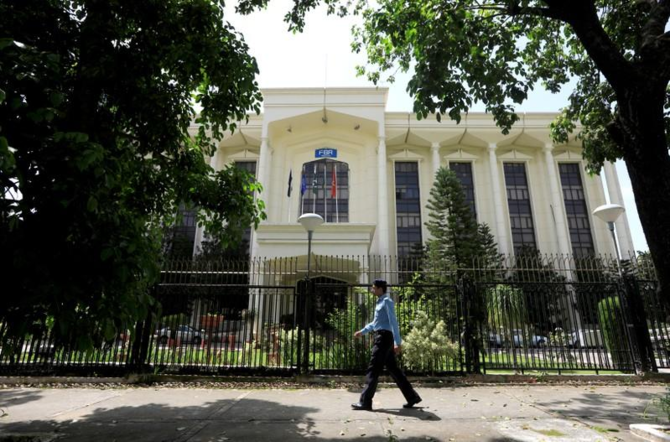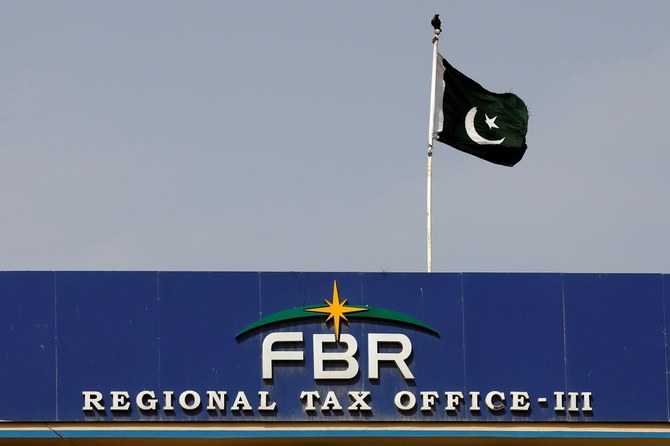KARACHI: Pakistan’s new tax profiling system has raised widespread fears of data security breaches, with citizens saying sensitive data uploaded on the portal may be misused and legal experts calling it unconstitutional and in violation of the fundamental right to privacy.
The two online portals, unveiled on Friday by the Federal Board of Revenue, hold information regarding the bank accounts, properties, travel history, and other data of at least 53 million Pakistanis, collected from Pakistan’s primary citizenry database, the National Database and Registration Authority (NADRA).
The tax portal comes on the back of the annual budget announced earlier this month which targets a sharp hike in tax revenues for the new fiscal year to June 2020. Ending a culture of rampant tax evasion is also high on the list of conditionalities attached to a $6 billion International Monetary Fund bailout package (IMF) that cash-strapped Pakistan agreed to last month.
Pakistan’s history is littered with statements by incoming governments announcing crackdowns and pledging tax reforms that fizzle out because of a lack of political will to force the rich and powerful to pay taxes.
As of last year, only 1.6 million people filed tax returns in a country of 208 million. Out of them, 400,000 showed income below the levels that tax cuts in, another 200,000 had minimal tax, and only 950,000 paid tax of any significance.
“Just checked it out. Security is too weak. Should require payment by a card in the name of the payer — as email verification possible if mobile not in taxpayer name,” marketing consultant Assad Ahmad said on Twitter. “Just got my data without giving a phone number registered in my name and answering simple questions about family.”
Experts are similarly alarmed.
“When over 100 million Pakistani citizens were disclosing their private data to NADRA, the understanding was that NADRA would use it only for issuing them an identity card, and not betray them to the tax-man,” Umer Gilani, a lawyer who campaigns for the protection of privacy, told Arab News. “NADRA’s decision to merge its database with FBR’s database is unconstitutional. It violates the fundamental right to privacy guaranteed by Article 14 of Pakistan’s Constitution,” he said, adding that Pakistan’s courts had consistently ruled that the right to privacy extended to the privacy of people’s data.
Sharing NADRA data with tax authorities and uploading it on what he called “a low security online portal” breached confidentiality, and was unsafe, Gilani said.
The FBR insists the data is safe.
“We will ensure the security of the data,” FBR chief, Syed Shabbar Zaidi told reporters on Friday. “The data will be kept centralized at FBR headquarters, even away from regional tax offices,”
Few are not convinced.
“The concerns are that in the absence of data privacy laws, the data the government is collecting through different sources... where will it be utilized and who is authorized to use it?” Dr. Umair Javed, a professor of politics at Lahore University of Management Sciences (LUMS), told Arab News.
According to Javed, the new Pakistan system has borrowed heavily from the blueprint of the United States’ Internal Revenue Services (IRS) which also employs different sources to collect data about citizens.
“Is the government prepared to guarantee its (data’s) security and privacy is the biggest question despite their good intentions and purpose,” he said.
A draft law for personal data protection is pending legislation since October last year, while the government has launched a huge online portal packed full of accessible citizen data with effectively no data privacy laws in place.
“In case of any security lapse, (there) would be dire consequences,” Badar Khushnood, Vice Chairman of the award-winning Pakistan Software Houses Association for IT and ITES (P@SHA), told Arab News. “The law should have been passed before launching the system for the clarity of data privacy,” he said.
Dr. Ikram ul Haq, a legal and taxation expert agreed.
“Security review by independent agencies renowned for awarding certifications is missing... There is no guarantee that data would not be misused or abused by the staff with access to it,” he said.
“It (profiling system) is a good thing, but it must be ensured that the information is not leaked and misused for extortion or... blackmailing,” said Dr. Mirza Ikhtiar Baig, Senior VP at the Federation of Pakistan Chambers of Commerce and Industry. “Our concern is that it could be leaked and harm any concerned individual.”
Fears of a massive data leak are not unwarranted. In 2018, a cyber-security services provider, the Pakistan Computer Emergency Response Team (PakCERT), reported 1,340 cases of website defacement and hacker attacks on Pakistani web domains (.pk).
“The .pk domain was attacked all over the world where it is being hosted or operated. The data only shows that websites were attacked and not necessarily reflect that the inside of the organizations’ systems were attacked,” Qazi Mohammad Misbahuddin Ahmed, CEO of PakCERT told Arab News. “If the security of the system is properly audited then there (is) no breach,” he said, adding that he assumed the government would have put security controls in place for the tax profiling portal.
There are additional concerns including that it might not take a sophisticated software hacker to break into the system, and that anybody with access to another person’s identity card could get hold of the information by paying a Rs.500 (approx $3) fee.
“The government has made it a source of making money by charging us for our own information,” P@SHA’s Badar Khushnood said. “By using NIC (national identity card) of any other person, anyone can get registered with the portal and get information,” he said, adding that the system could be useful in the documentation of the country’s vast informal economy only if its security protocols were made foolproof.
Pakistan’s new online tax profiling portal sparks data privacy fears
Pakistan’s new online tax profiling portal sparks data privacy fears

- Personal data of 53 million people uploaded to a new tax database accessible through a national ID card number
- Legal experts call the system unsafe, unconstitutional, in violation of privacy rights
Temperatures in Pakistan may hit 50°C this week, a global record — report

- Wednesday and Thursday might be the hottest April days for Pakistan, says report
- Says Pakistan recorded temperatures over 4 degrees above average so far this month
ISLAMABAD: Temperatures in central and southern Pakistan may surge to 50°C this week, nearing the global record for the highest temperature ever recorded in April, as per a report by American newspaper The Washington Post.
The warning comes amid increasingly unpredictable climate patterns across South Asia, with several cities in Pakistan’s southern Sindh province such as Karachi experiencing more frequent and intense heatwaves in recent years— a trend that climate experts attribute to broader shifts caused by global warming.
The situation underscores rising concerns over Pakistan’s preparedness for extreme weather events amid growing calls for stronger climate adaptation policies, increased tree cover in urban areas and more effective public awareness campaigns.
“Temperatures in central and southern Pakistan rose to 118 degrees Fahrenheit (47.8°C) last weekend and are forecast to climb through Wednesday, possibly nearing the global April record of 122 degrees Fahrenheit (50°C),” The Washington Post said in a report.
“Heat will build across the Middle East and South Asia through the week, with Wednesday and Thursday looking like the hottest days for Pakistan.”
It added that Sindh’s Nawabshah city had reached the 50°C mark back in April 2018 and could repeat the same this week. Nawabshah recorded a temperature of 50.2°C back then and set a new global record for the highest temperature ever observed in April.
The report said “a sprawling dome of high pressure like a heavy lid trapping heat in a pot” was causing the current heat wave, stretching from the Middle East to South Asia. It noted that this area experiences the Earth’s most unusually warm temperatures during April.
It quoted the European Center for Medium-Range Weather Forecasts as predicting the maximum temperature to remain around 50°C in central Pakistan on Wednesday and Thursday.
“Temperatures have been more than 4 degrees above average in Pakistan so far this April, even before the arrival of this week’s potentially record-breaking heat,” it added.
Pakistan ranks among the top ten countries most vulnerable to climate change, grappling with increasingly frequent extreme weather events from deadly heatwaves to devastating floods.
The 2015 heatwave claimed over 2,000 lives in Karachi alone while the 2022 floods left more than 1,700 dead and over 33 million displaced nationwide.
‘Strive for peace’: Saudi Arabia seeks de-escalation of Pakistan-India tensions

- Riyadh urges neighbors to resolve disagreements through diplomatic channels, strive for stability and peace for their people and region
- Tensions have surged following attack on tourists in Indian-administered Kashmir that New Delhi blames on Pakistan, which denies the charge
ISLAMABAD: Saudi Arabia has expressed concern over heightened tensions between nuclear-armed neighbors Pakistan and India amid exchanges of fire along their disputed border separating Kashmir and fears of an Indian military incursion, state news agency SPA reported on Wednesday.
Relations have plummeted following a deadly attack on tourists in Indian-administered Kashmir on Apr. 22 that New Delhi has said Pakistan was involved in. Islamabad denies the charges. Fears have risen since that India may conduct limited airstrikes or special forces raids near its border with Pakistan.
Pakistan’s information minister said on Tuesday night the country had “credible intelligence” India intended to carry out military action against it in the “next 24-36 hours on the pretext of baseless and concocted allegations of involvement in the Pahalgam incident.”
“The Kingdom appealed to both nations to de-escalate, avoid further escalation, resolve their disagreements through diplomatic channels, uphold the principles of good neighborliness, and strive for stability and peace for the welfare of their people and region,” SPA said.
Meanwhile United Nations Secretary-General Antonio Guterres spoke separately on Tuesday with Pakistan’s Prime Minister Shebaz Sharif and India’s Foreign Minister Subrahmanyam Jaishankar.
“The Secretary-General also expressed his deep concern at rising tensions between India and Pakistan and underscored the need to avoid a confrontation that could result in tragic consequences. He offered his Good Offices to support de-escalation efforts,” UN spokesperson Stephane Dujarric said.
The US State Department has also said Washington was in touch with both India and Pakistan while urging them to work toward what it called a “responsible solution.”
In public, the US government has expressed support for India after the attack but has not criticized Pakistan.
Since the attack, in addition to soldiers shooting over the Line of Control frontier that divides disputed Kashmir between the two nations, India and Pakistan have announced tit-for-tat diplomatic measures that included cancelation of visas and a recall of diplomats.
New Delhi also suspended a crucial water-sharing treaty with Islamabad and ordered its border shut with Pakistan. In response, Pakistan has closed its airspace to Indian airlines.
Kashmir is disputed between India and Pakistan since 1947, with both ruling it in part but claiming it in full.
Pilgrims begin arriving in Madinah as Pakistan launches Hajj flights operation

- Over 89,000 pilgrims will travel under the government’s scheme, traveling to Makkah and Madinah via 342 flights
- Pilgrims from Karachi and Islamabad are availing Makkah Route Initiative designed to streamline immigration process
ISLAMABAD: Pakistani pilgrims who will perform the annual Hajj pilgrimage this year under the government scheme began arriving in Madinah this week as Pakistan kicked off its 33-day-long Hajj flight operation.
Over 89,000 pilgrims will travel under the government’s scheme, departing for Makkah and Madinah via 342 flights, with the last one departing from Pakistan on May 31. The first Hajj flights departed from Islamabad, Lahore, Karachi and Quetta for the Saudi city of Madinah on Tuesday.
“First flight carrying 393 pilgrims from Islamabad landed at Prince Mohammad bin Abdulaziz International Airport,” Radio Pakistan reported on Wednesday.
“The intending pilgrims were transported to their residences in special buses. Later, they were warmly received at their hotels and presented flowers, chocolates, dates and refreshments as per Saudi cultural traditions.”
The pilgrims from Karachi and Islamabad availed the Makkah Route Initiative, which is designed to streamline immigration processes by enabling pilgrims to complete official travel formalities at their departure airports. Initially tested in Islamabad in 2019, the program was later expanded to Karachi, benefitting tens of thousands of Pakistani travelers. This saves pilgrims several hours upon arrival in the Kingdom, as they can simply enter the country without having to go through immigration again.
Around 50,500 Pakistani pilgrims will travel to Saudi Arabia under the initiative this year. The scheme was launched in 2019 by the Saudi Ministry of Hajj and Umrah and has been implemented in five countries: Pakistan, Malaysia, Indonesia, Morocco and Bangladesh.
Besides those using the government scheme, 23,620 Pakistanis will also perform Hajj through private tour operators.
The total quota for pilgrims granted to Pakistan for 2025 was 179,210, which could not be filled.
Traditional Swati rice dish finds new life at Pakistani valley’s roadside eatery

- Restaurant owner Nasar Khan began preparing warjale as a hobby, turned it into a business after strong demand
- Labor-intensive dish prepared with begumi rice grown in Swat and mixed with naturally occurring bitter wild greens
SWAT: At a small mudbrick, hut-style restaurant in Pakistan’s picturesque Swat Valley, customers are showing up to try a traditional delicacy: warjale.
A local version of vegetable rice served with clarified butter, yogurt, cheese, milk, fresh cream and sometimes with the sauce of chicken meat, warjale, an old regional dish, is being kept alive as the main attraction at the Kawdareen Traditional Restaurant (KTR) in Mingora city.
Known for its scenic landscape of mountains and trees and cultural heritage and archaeological sites, Swat attracts thousands of visitors every year.
Many now seek out Khan’s modest eatery to experience a taste of the valley’s traditional cuisine, especially warjale, which is made from a special rice called begumi, named after a noblewoman, Begum Bilqees Effandi, who had brought the rice variety’s seeds from Afghanistan in 1949 and cultivated it in the Bagh Dherai area of Swat for the first time.
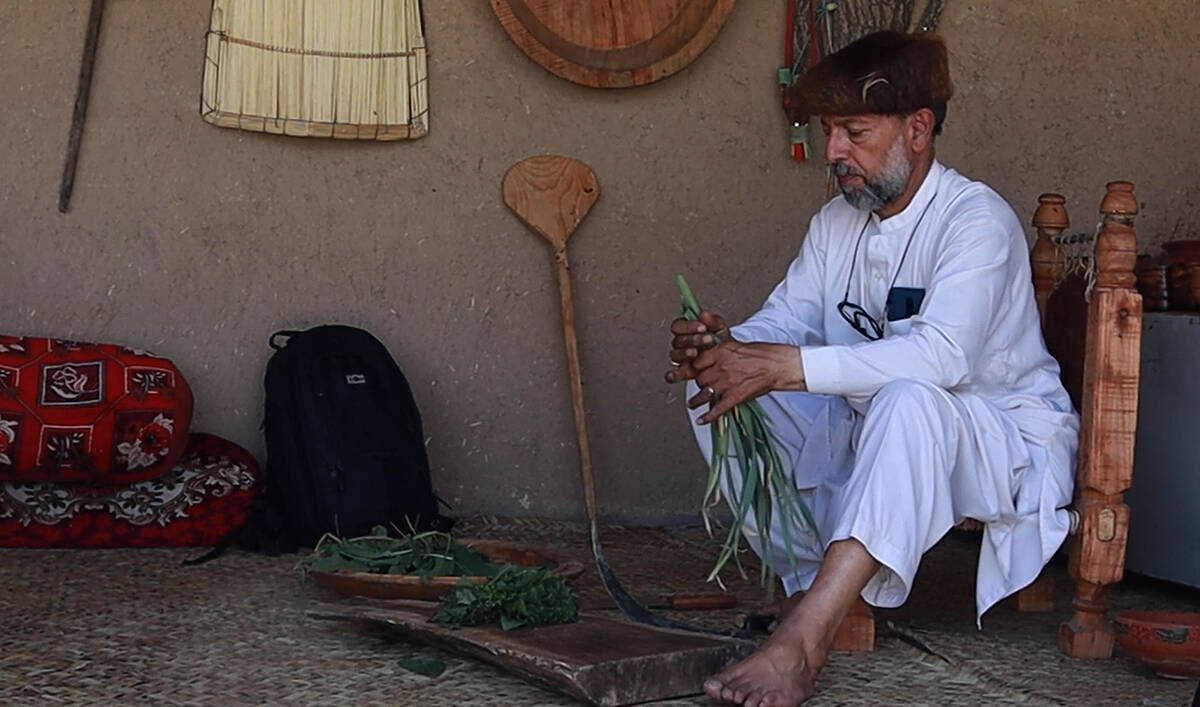
“I had another business, this was my hobby but God gave me a chance and made this a business out of my hobby,” Nasar Khan, the 60-year-old owner, told Arab News at the restaurant which he started six years ago to revive traditional foods from the valley and introduce them to young people.
“I had in mind that our traditional food should be commercialized so that the youth who don’t know about it should get a sense of it, that was the main aim.”
Khan said he served nearly all the traditional foods of Swat, such as warjale, khare, a popular dish made with lamb, tomatoes, garlic and minimal spices cooked in a traditional karahi pan, as well as saag, which is cooked mustard or similar bitter wild greens.
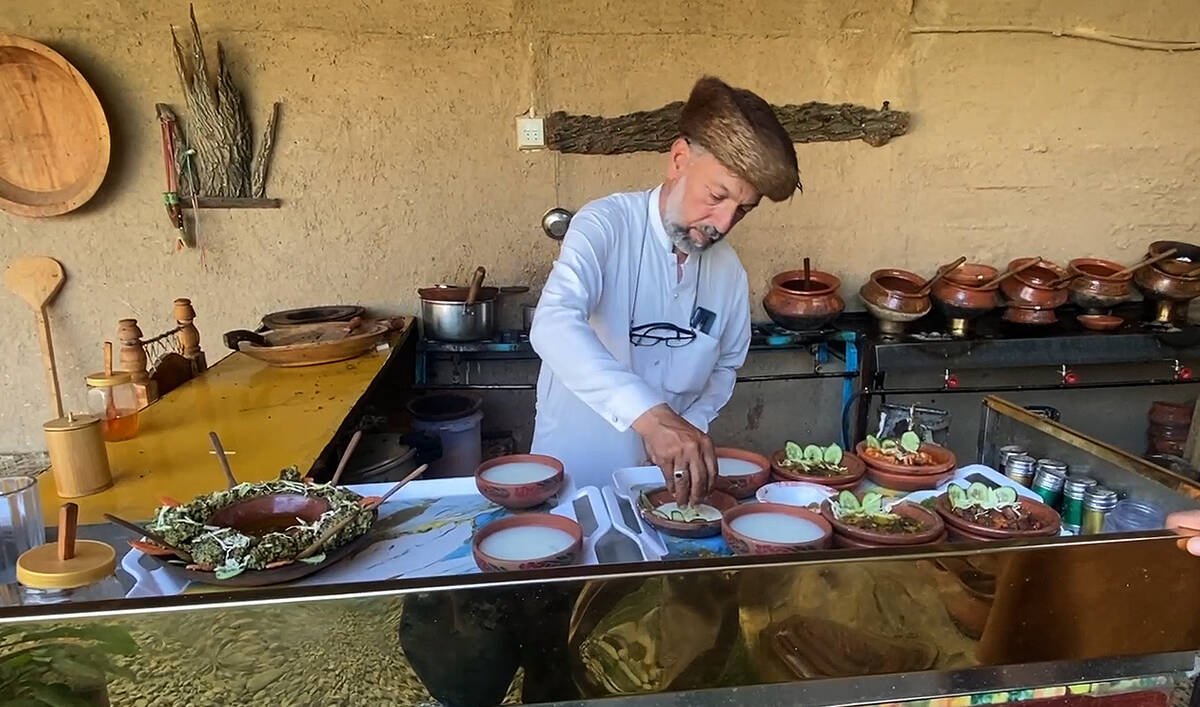
A warjale meal was typically served with desi ghee, fresh cream and a yogurt-based drink called lassi. A portion for two people costs around Rs1,000, less than $1, while a three-person meal costs around Rs1,300.
Cooking warjale was a labor-intensive task, Khan explained.
“Warjale is cooked in a specific kind of saag, which can’t be cultivated but grows naturally,” he said. “The locals then pluck it and cut it in a special way … People of upper Swat call it chukan and those who live in the lower part call it warjale.”
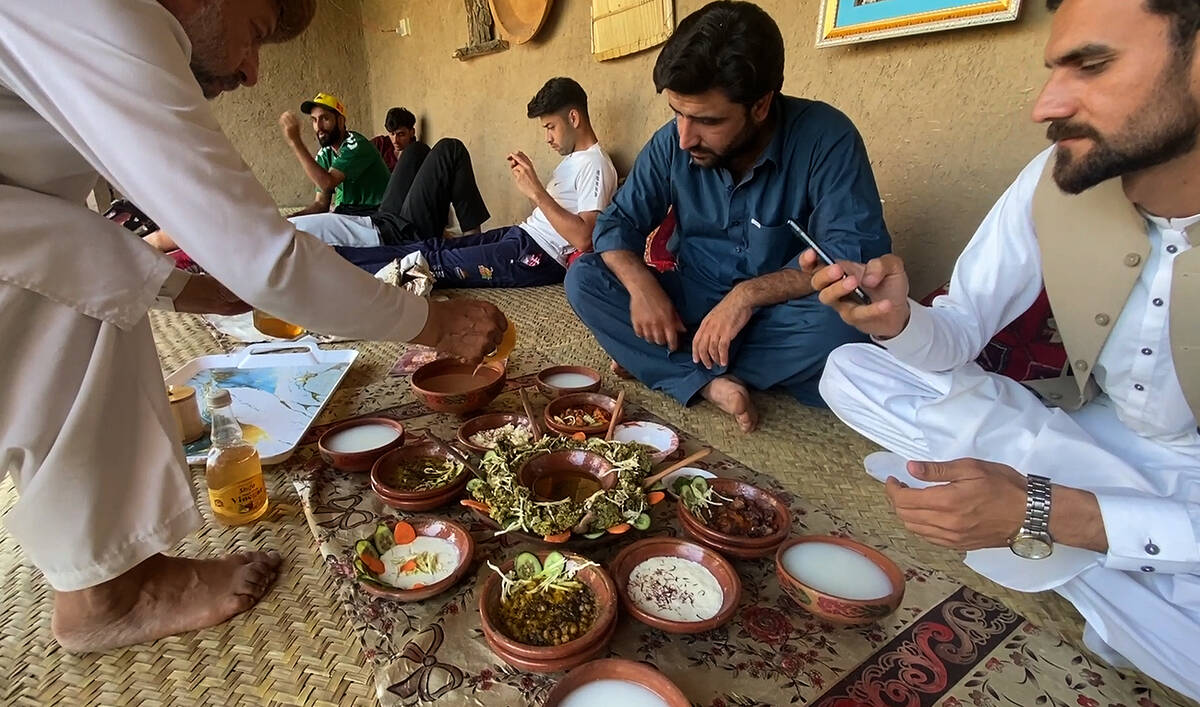
Khan said warjale’s distinct flavor derived from ingredients that could only be sourced in Swat’s environment.
“The soil of Swat is fit for growing [Begami rice], which needs cold weather, fresh water and an environment like this,” he said.
Tourists visiting the restaurant vouched for the unique taste.
Izhar Zeb Yousafzai, a computer science lecturer visiting from Timergara, said he first heard about KTR online:
“We saw some videos about this restaurant on social media. We had a day off today, so we came here with friends ... Warjale was their specialty and we got a chance to eat it after a long time. When we gave it a try, we found its taste delicious.”
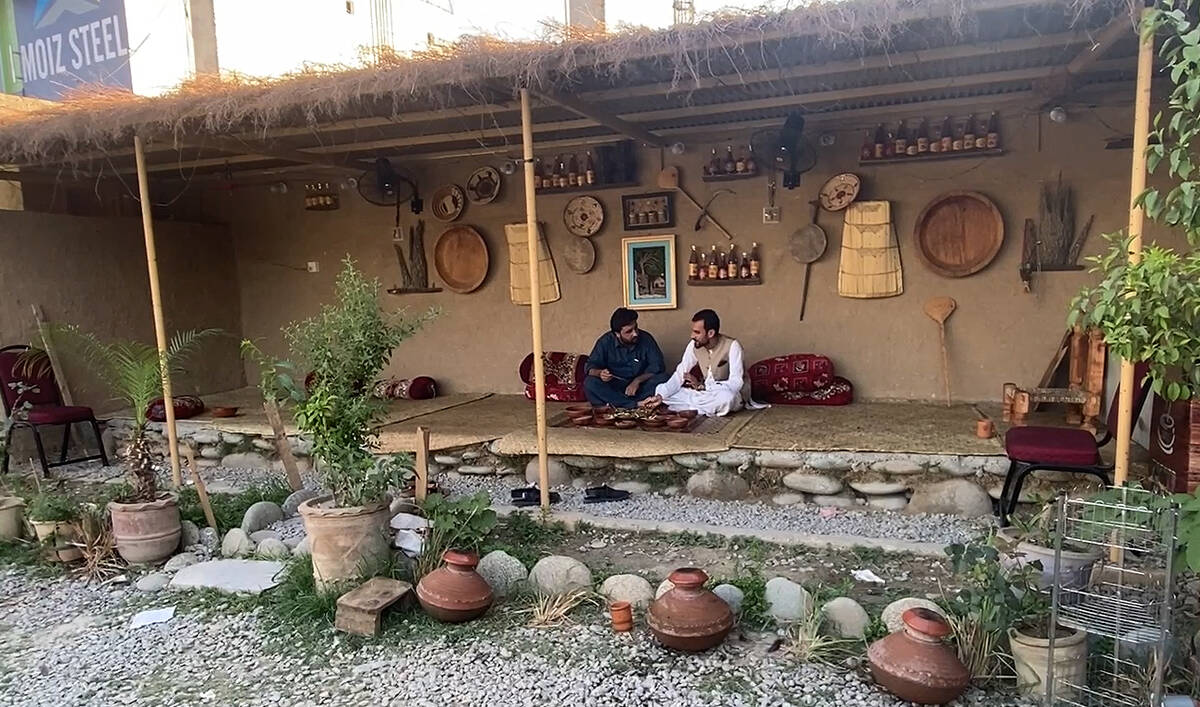
Asad Khan, a 28-year-old resident from Besham in Shangla district, said he had come to Swat for sightseeing before he heard about the restaurant and the dish.
“Warjale is the traditional food of Swat,” he said. “The way it is cooked and then presented with desi ghee, it has an exceptional taste, we can’t explain it.”
Pakistan says army destroyed Indian posts along Kashmir border after ‘unprovoked’ firing

- Indian forces used small arms to attack Pakistani posts in Kayani and Mandal sectors on Tuesday night, state media reports
- Pakistan information minister says Islamabad has “credible intelligence” New Delhi intends to launch military action within 36 hours
ISLAMABAD: Pakistan army troops responded to “unprovoked” Indian shelling on Tuesday night across the de facto border that divides the disputed Kashmir region between the two nations, state media reported on Wednesday citing security sources, adding that Indian posts were destroyed in the exchange.
Tensions have surged between the nuclear-armed neighbors following a deadly attack on tourists in Indian-administered Kashmir on Apr. 22 that New Delhi has said Pakistan was involved in. Islamabad denies the charges and has said it will participate in any credible and transparent investigation of the assault.
Fears have risen since that India may retaliate by conducting limited airstrikes or special forces raids near the Line of Control (LoC), which runs 742km (460 miles) dividing the parts of Kashmir governed by India and Pakistan and acts as part of the de facto border between the two countries.

State-run Pakistan Television (PTV) reported India had carried out “unprovoked” firing in the Kayani and Mandal sectors of the Line of Control on Tuesday night. Small arms were used by the Indian forces, prompting Pakistan to respond.
“There are also reports that multiple enemy posts were destroyed by the Pakistan Army’s effective response,” PTV said, naming one of them as the Chakpathra post.
PTV said India had earlier evacuated areas near its side of the disputed Kashmir border and launched a “crackdown” against Muslims in the area. These reports have not been independently verified.
“This provocation from India reflects its war hysteria,” PTV said. “The Pakistan Army is fully prepared to defend the country’s sovereignty at all times.”
Earlier on Wednesday, the state-run Associated Press of Pakistan reported that a “timely” response by the Pakistan Air Force (PAF) had “forced” four Indian Rafale jets to retreat after payrolling near the two nations’ de facto border.
“On the night of April 29/30, four Indian Rafale jets conducted patrolling within Indian geographical boundaries” near the LoC, APP reported, saying PAF “immediately” detected the jets.
“A timely and swift response by the Pakistan Air Force forced four Indian Rafale jets to retreat … The Pakistani armed forces remain fully prepared and alert to give a befitting response to any aggression from India.”
Since last Tuesday’s attack, in addition to shooting over the Line of Control frontier, India and Pakistan have announced tit-for-tat diplomatic measures that included the cancelation of visas and a recall of diplomats. New Delhi also suspended a crucial water-sharing treaty with Islamabad and ordered its border shut with Pakistan. In response, Pakistan has closed its airspace to Indian airlines.
Late on Tuesday night, Pakistan’s Information Minister Ataullah Tarar said Pakistan had “credible intelligence” India was planning military action against it in the “next 24-36 hours on the pretext of baseless and concocted allegations of involvement in the Pahalgam incident.”
The statement came after Indian Prime Minister Narendra Modi on Tuesday reportedly authorized his country’s armed forces to respond to the latest attack in whatever way it deemed fit.
India and Pakistan both claim Kashmir in full and rule it in part since 1947.


